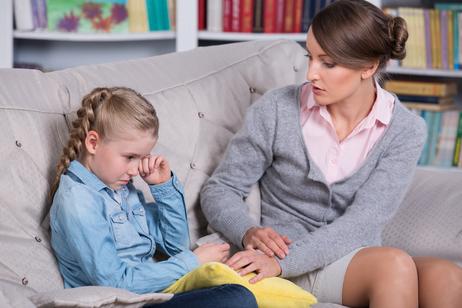It is a fact of life that children are sometimes going to break the rules. It’s also a fact that they’ll occasionally show an outburst of emotion or throw a tantrum in the middle of the grocery store. Childhood development is a trying time and children are often ill-equipped to understand or properly deal with the changes they’re going through.
But there is a point at which behavioral issues go beyond the point of being normal. If your child is becoming extremely withdrawn and avoiding social interaction, it might be something more. If your child is expressing angry or violent thoughts and behaviors, it might be something to worry about. Mental health is a difficult thing to gauge, but you can see the signs when your child exhibits behaviors that are abnormal for their personality or for other children of their age. It is your job as a parent to notice the change and to seek help.
In this article, we’ll explore the subject of mental health issues in school children. We’ll talk about the most common issues affecting children of school age and how parents and teachers can work together to identify those issues. We’ll also talk about what schools and parents can do to support these children.
This TEDx Talk discusses mental health in our schools.
How Common Are Mental Health Issues in Children?
According to the National Alliance on Mental Illness (NAMI), more than 19% of American adults experience mental illness each year – that’s roughly 1 in 5 adults. Mental health issues affect millions of people each year, though awareness is spreading, and more people are seeking help.
But what about those who don’t understand what’s happening to them? How can they get the help they need if they don’t know to ask for it?
Mental health issues in children can be difficult for parents to identify. Not only do many parents not know the signs of mental illness, but changes in behavior are normal in growing children. It’s difficult to say whether certain changes should be attributed to normal growth and development or whether they might be early signs of a growing problem. What’s more, the stigma against mental health leads many parents to ignore the early signs of mental illness if they do, in fact, notice them.
According to the Association for Children’s Mental Health (ACMH), 1 in 5 children and youth have some kind of diagnosable emotional, behavioral, or mental health disorder. Furthermore, 1 in 10 adolescents has a mental health issue serious enough to impair their function at home or in school.
In many cases, when a child struggles at school, mental health is not the first potential cause to be investigated. It is easier to blame the child’s home life, socioeconomic status, or even the child’s ability to learn for academic issues rather than recognizing that something deeper may be going on – instead of recognizing that the child might be in need of support.
This video offers some steps to a mental health framework in our schools.
What Are the Top Children’s Mental Health Concerns?
Children can be affected by the same mental health issues as adults, though they typically express them in different ways. For example, an adult with depression may have trouble concentrating or enjoying activities they once enjoyed. In children with depression, irritability is a more common symptom than sadness. Children are also more likely to display behavioral changes as a manifestation of mental issues. For many children, these come out in the form of behavioral issues like oppositional defiant disorder (ODD), conduct disorder (CD), or obsessive-compulsive disorder (OCD).
Some of the most common mental health issues affecting school children are:
- Anxiety Disorder
- Attention-Deficit Hyperactivity Disorder (ADHD)
- Autism Spectrum Disorder (ASD)
- Eating Disorders
- Mood Disorders
Anxiety disorders take many forms. In children, some of the most common kinds are obsessive-compulsive disorder, post-traumatic stress disorder, social phobias, and generalized anxiety disorder. Some amount of worry is normal for any person to experience, child or adult, but when it makes it difficult for the child to function in school or in social interactions, it could be something more serious.
Attention deficit hyperactivity disorder is a complex neurodevelopmental disorder that manifests with a wide variety of symptoms. Many people assume that difficulty concentrating is the primary symptom, but that is not necessarily the case. ADHD affects the child’s ability to process their own emotions and to recognize other people’s emotions and needs. This often takes the form of impatience and fidgetiness but may also involve trouble following instructions and frequent daydreaming.
Another mental health issue that is difficult to identify and understand is an autism spectrum disorder. It is a developmental disorder that affects the child’s communication and behavior. It typically manifests in the first three years of life and is called a “spectrum” disorder because symptoms vary greatly in type and severity. Every child with ASD is different, but many children with the disorder have difficulty communicating and interacting with other people which can be a challenge at school.
In addition to mental health issues that have a neurological foundation, there are also some mental health disorders that can develop over time from the child’s situation or environment.
Eating disorders and mood disorders can affect children of all ages and are often brought about initially by stress or trauma. Children have difficulty identifying and dealing with their emotions, at times, so they sometimes develop unhealthy coping mechanisms. Eating disorders like anorexia, bulimia, and binge-eating disorder can become life-threatening and mood disorders can lead to dangerous and even suicidal thoughts.
What Behavior is “Normal” for Growing Children?
As a parent, you can’t be expected to understand everything your child does. You should, however, know your child well enough to notice when something changes. You may not know why your child is exhibiting a change in behavior, but if you notice something, bring it to your pediatrician’s attention. In addition to noticing changes in your child’s behavior, it also helps to know what is and isn’t normal for his or her age group.
Here is a quick overview of normal behavior in children of different ages:
- Preschool (4 to 5 years) – Children at this age start to seek their independence and learn how to say “no.” They may throw the occasional tantrum but should begin to gain control over their emotions and impulses. There may be minor outbursts of aggression but should be learning how to use their words. Time-out is an effective discipline technique at this age.
- Grade School (6 to 9 years) – Children at this age start to take on more responsibility and start to want more freedom (often more than they can handle). They require guidance to complete chores and homework but will begin to solve problems on their own. They’ll start to experience more complex emotions like frustration and anxiety and may lack verbal impulse control. Positive reinforcement-style discipline is effective at this age.
- Tweens (10 to 12 years) – At this age, children want even more independence and often become mildly oppositional and argumentative toward parents. They may lack the ability to see the long-term consequences of their behavior and may struggle with social skills.
- Teens (13 and over) – Children at this age like to think they are adults but will still struggle with making healthy decisions. Teens go through a variety of phases as they struggle to find themselves as individuals and may change social groups often. Minor rebellion is normal but teens should have improved self-discipline when it comes to doing chores and homework.
As you can see (and have probably already experienced), your child’s behavior can be expected to change over time. Once your child hits a certain age, however, they’ll be spending more time in school and you may not notice the changes as quickly. Read on to learn how to know if your child is hiding problems at school.
Is Your Child Hiding Problems at School?
Every child experiences ups and downs at school. Changing classrooms, learning difficult material, and going through developmental changes are all sources of stress that can affect your child’s behavior at school as well as his mental health. Through all of these changes, it is the parent’s responsibility to keep an eye out for warning signs that your child is struggling more than is normal.
Here are some of the most common signs of mental illness in children:
- Changes in mood (ex: feelings of sadness, withdrawal, or mood swings).
- Intense emotions (ex: overwhelming fear, angry outbursts, extreme anxiety).
- Changes in behavior (ex: out of control behavior, frequent fighting, using weapons).
- Difficulty concentrating decreased performance in school.
- Unexplained weight loss or changes in appetite.
- Physical symptoms such as frequent headaches or stomachaches.
- Self-injury or self-harm, such as cutting or burning and attempted suicide.
- Substance abuse, using or abusing drugs and alcohol.
Unfortunately, these signs are not always easy to identify. In fact, your child could hide some of these symptoms from you if they are worried or ashamed. It is then your job to read between the lines and to see what is really happening.
Here are some hidden signs that your child made be struggling at school:
- Making excuses not to go to school such as faking being sick.
- Skipping school or cutting classes without your knowledge.
- Losing interest in school and in extracurricular activities.
- Developing low self-esteem, comparing self to other children.
- Frequently getting detention or being disciplined at school.
- Refusing to do homework and/or getting poor grades in school.
If you notice your child displaying any of the obvious signs of mental illness or the hidden signs of school problems, don’t ignore it. Failing to acknowledge your child’s struggle can make matters worse – if the parent doesn’t acknowledge the problem, the child may end up feeling like it isn’t real, or it doesn’t matter. Your child’s mental health is fragile and worth protecting.
What Can Schools Do to Support Students’ Mental Health?
Failing to notice or address issues at school means that your child’s mental and behavioral issues could get worse. More importantly, it leaves your child to deal with those issues alone.
Issues in school can lead to a variety of additional problems for children. For one thing, children with school problems have an increased risk of dropping out. Avoiding school or cutting classes in the short term due to school issues can have long-term repercussions. Your child could fall behind in school and, if their mental and behavioral health issues persist, they may have trouble getting back on track in the future. Worse, they might be labeled a troublemaker and be disregarded entirely.
So, what can schools do to support the mental health of their students?
For many students who have issues with behavior, mental health, or learning ability, the best solution is to develop an individualized education program (IEP) or a 504 plan.
Technically speaking, an IEP is a legal document that lays out the details of a special education program involving instruction, support, and other services a child needs to succeed in school. In reality, however, an IEP is more than just a written document – it’s a roadmap for teachers and other school staff to help them provide for the child’s unique needs. IEPs are a common part of public education.
If your child does not require special education to provide for his unique needs, a 504 plan might be more applicable.
These plans are developed for children who can do well in a standard classroom but need special supports or services to be able to learn in that environment. Some of the provisions your child might receive with a 504 plan include extended time on tests, the ability to leave the classroom to take short breaks, or classes to learn coping mechanisms or study skills.
Whether your child receives an IEP, a 504 plan, or neither, it is your job as a parent to provide support at home. Ideally, you’ll be able to work with your child’s teachers and other school staff to make sure your child’s needs are met while he is at school, but it is your job to provide support at home.
How Can You Support Your Child’s Mental Health at Home?
As a parent, you want what’s best for your child. Unfortunately, it can sometimes be difficult to tell what that is, especially when your child isn’t forthcoming about problems they’re experiencing. Add to that the fact that your child spends a majority of time at school where you can’t observe him, and you can see how mental health issues frequently fall to the wayside.
What can you do as a parent to support your child’s mental health at home?
The first step in getting your child the help they need is diagnosing the problem. Talk to your pediatrician and provide as much information as you can about your child’s behavior, mood, and problems in school. If you haven’t experienced things first-hand, get a detailed report from your child’s teacher or other school staff to help your pediatrician get an accurate picture of the problem.
Once your child has been diagnosed with a mental or behavioral health issue, it is important to develop a plan for treatment. Treatment doesn’t always (and in many cases shouldn’t) involve medication. For children, it often involves supportive therapies to help children cope with the challenges they are experiencing. You and your pediatrician will work together to decide what is best for your child.
Here are some of the most effective treatment options for children with mental health issues:
- Psychotherapy – Also known as talk therapy, psychotherapy is one of the most effective forms of treatment for mental health issues in general, not just for children. The goal is to teach your child how to understand their mental challenges and to teach them helpful ways of dealing with those challenges. Even if you don’t directly participate in your child’s sessions, your child’s therapist will want to work with you to make sure your child is getting what they need.
- Medication – Medication is not the preferred first option for the treatment of mental health disorders in children, but it is warranted in some cases. Depending on what your child is struggling with, your pediatrician may prescribe antidepressants, stimulants, mood stabilizers, or something else. It is your job to make sure your child takes the medications in the proper dose at the proper times, though you should also teach your child how to manage the medication.
- Family Counseling – Even though your child is the one dealing with mental health challenges, it can have an impact on the entire family. Family counseling can help you learn what is going on with your child and how you can help. It is also a great way to learn what not to do – things that could set your child back or keep him from getting the support he needs.
- Support for Parents – Being a parent means putting your child’s needs before your own, but you can’t give your child everything he needs if you don’t have to support yourself. Support groups and various resources are available to help you relieve stress, seek individualized help, and learn new strategies for helping your child with their mental health issues.
The next most important thing you can do is build and maintain a strong relationship with your child’s teachers and with the school.
If your child has been diagnosed with a mental or behavioral health issue, bring it to the school’s attention and make sure they are involved in your treatment plan. If your child requires special care or attention at school, work with the school to make sure they get what they need. If the school refuses to work with you or isn’t able to offer anything in the way of assistance, it might be time to look for another school that better suits your child’s needs.
By bringing your pediatrician and your child’s teachers together, you can create a comprehensive support system for your child. It is your job to maintain those connections and to facilitate the treatment plan. Though the road may be difficult, your child depends on you for love and support so do everything you can to give your child what they need to succeed and grow.
Questions? Contact us on Facebook. @publicschoolreview















